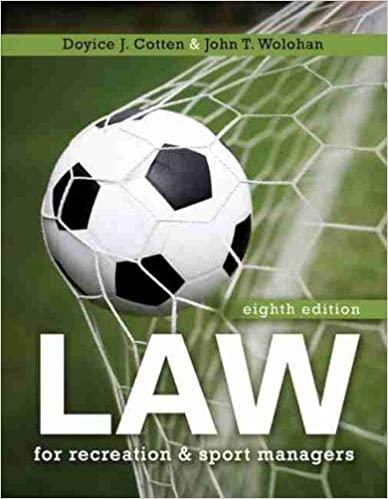Question
Landmark Case: Sherwood v. Walker , 66 Mich. 568, Supreme Court of Michigan, 1887 Facts: Rose 2d of Aberlone was a gentle, 1,420 lb. cow
Landmark Case: Sherwood v. Walker, 66 Mich. 568, Supreme Court of Michigan, 1887
Facts: Rose 2d of Aberlone was a gentle, 1,420 lb. cow that lived in Michigan in 1886. Rose's owner, Hiram Walker & Sons, was a cattle breeder who bought her for $850. After a few years, Walker concluded that Rose could have no calves. As a barren cow, she was worth much less than $850, so Walker agreed to sell her for beef to T. C. Sherwood. Walker told Sherwood that Rose was "probably barren, and would not breed." After some negotiation, Walker agreed to sell Rose for "five and one-half cents per pound, live weight, fifty pounds' shrinkage," or $80.
But when Sherwood came to collect Rose, the parties realized that (surprise!) she was pregnant. As a confirmed breeder, Rose was now worth about $1,000. Walker refused to part with the happy mother, and Sherwood sued for breach of contract. Walker defended, claiming that both parties had made a mistake and that the contract was voidable. After the lower court ruled the contract was enforceable, Walker appealed.
Issue:Does a bilateral mistake render a contract voidable?
Excerpts from Justice Morse's Decision: A party who has given an apparent consent to a contract of sale may refuse to execute it, or he may avoid it after it has been completed, if the assent was founded, or the contract made, upon the mistake of a material factsuch as the subject matter of the sale, the price, or some collateral fact materially inducing the agreement; and this can be done when the mistake is mutual. If there is a difference as to the substance of the thing bargained for, then there is no contract; but if it be only a difference in some quality or accident, the contract remains binding.
The mistake of the parties went to the whole substance of the agreement. The parties would not have made the contract of sale except upon the understanding and belief that she was incapable of breeding, and of no use as a cow. A barren cow is substantially a different creature than a breeding one. There is as much difference between them for all purposes of use as there is between an ox and a cow that is capable of breeding and giving milk. The mistake affected the character of the animal for all time, and for its present and ultimate use. She was not in fact the animal, or the kind of animal, the defendants intended to sell or the plaintiff to buy. The mistake affected the substance of the whole consideration, and it must be considered that there was no contract to sell or sale of the cow as she actually was. The thing sold and bought had in fact no existence. Defendants had a right to rescind, and to refuse to deliver, and the verdict should be in their favor.
Questions: Provide well-thought-out answers to the following questions:
1. What did the parties agree to in their contract?
2. As a general rule, is a seller legally entitled to terminate a contract just because it turned out that he made a bad deal? Explain.
3. Who won this case?
4. What is the governing legal principles?
5. Was there a mutual mistake? If so, what was the mistake?
Step by Step Solution
There are 3 Steps involved in it
Step: 1

Get Instant Access to Expert-Tailored Solutions
See step-by-step solutions with expert insights and AI powered tools for academic success
Step: 2

Step: 3

Ace Your Homework with AI
Get the answers you need in no time with our AI-driven, step-by-step assistance
Get Started


